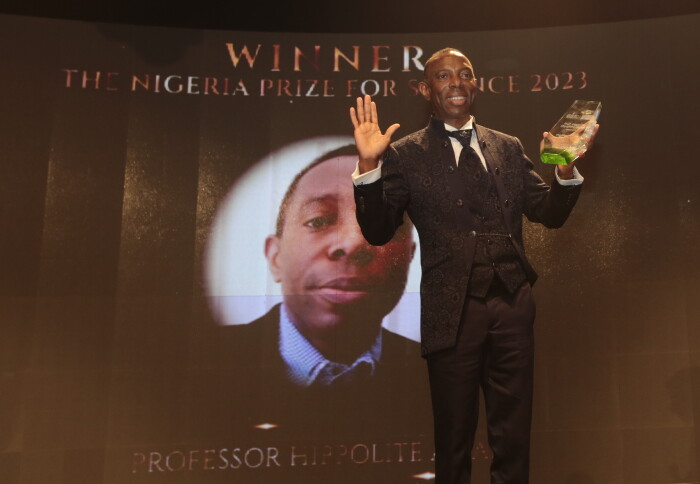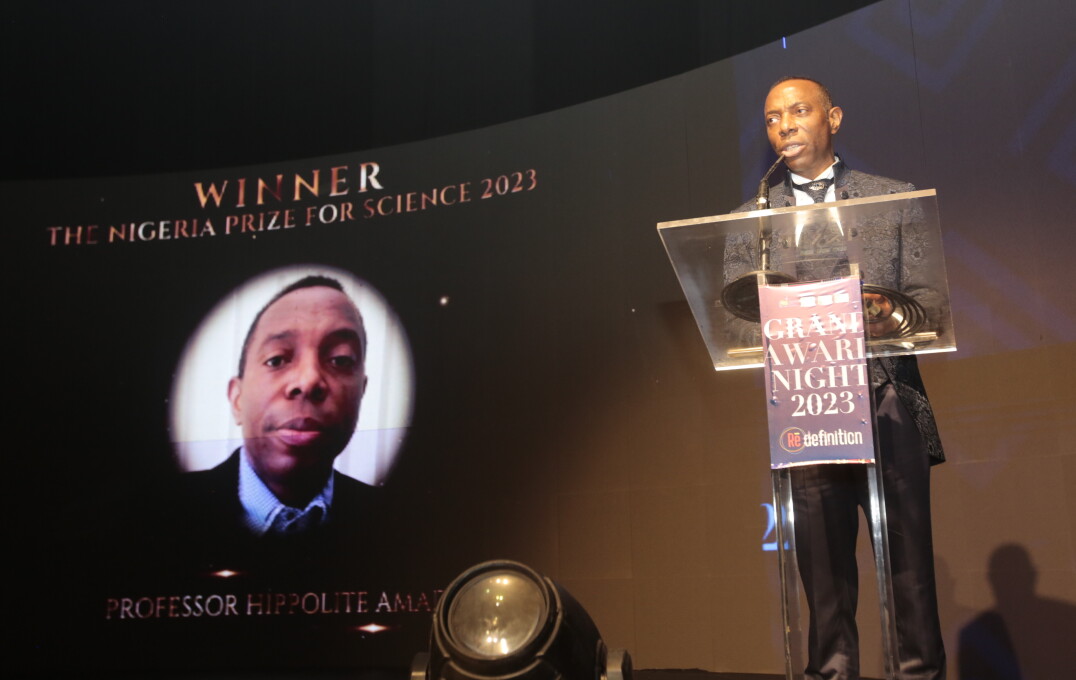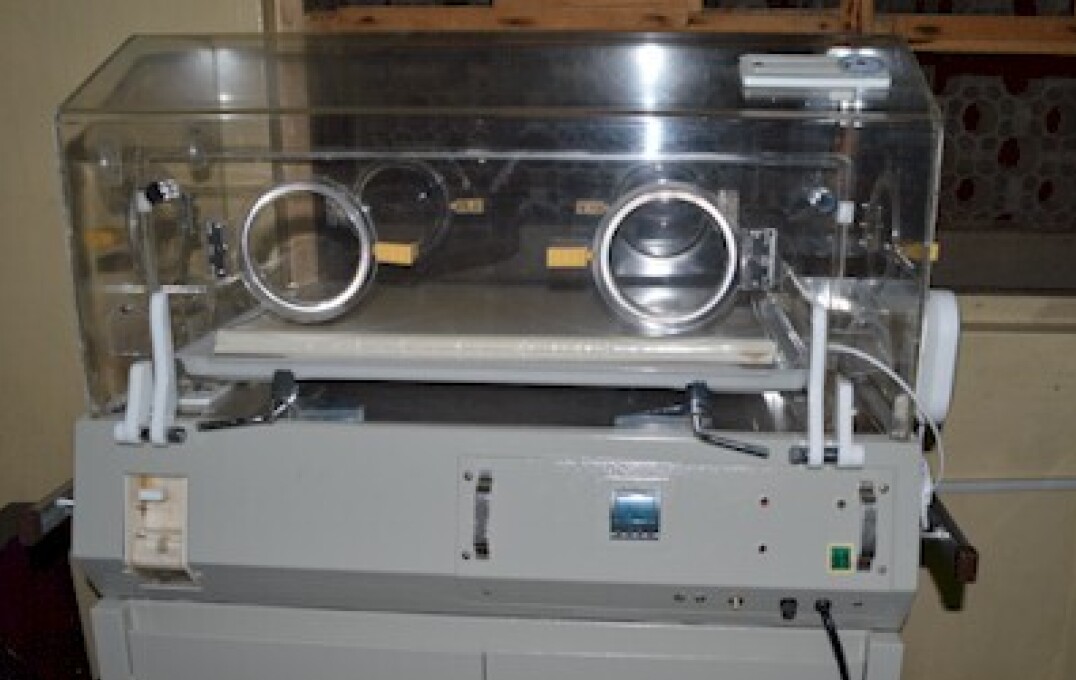Black History Month 2023 Spotlight: Professor Hippolite Amadi

Professor Amadi at the Nigerian Science Prize award ceremony in Lagos in October 2023
Professor Amadi discusses his work to provide frugal Medical Technology for low & middle-income countries and how Nigeria has influenced his research.
Who is Professor Amadi?
I am Hippolite Amadi, and I am a Medical Engineer. I studied Mechanical and Production Engineering at undergraduate level. Then, I studied Production Engineering Management at a postgraduate level before I came to Imperial College to start my Engineering in Medicine training. I then conducted a PhD in Orthopaedics, specialising in shoulder biomechanics, but I had a broad interest in the survival of newborn babies.
So, you could see me as an Orthopaedic Biomechanics Specialist by training. Still, through my passion and practice, I'm now better known globally as a researcher in neonatal technologies and global neonatal mortality reduction.
Exploring neonatal technologies and neonatal mortality reduction in Nigeria
As a child and young man, I thought it was improper that neonates were dying. I felt I could use my engineering knowledge to help, but my education in medicine was limited.
That’s how I came to Imperial. I wanted to take part in medical training that would have a quick benefit and was worried that I would have to start right back at the beginning of the educational journey. I preferred to join the medical family midway, and Imperial College allowed me to do this.
My mentor at the time, Professor Bob Schroter, who described himself as an “elderly, soon-to-retire academic who couldn’t deal with my academic energy”, introduced me to Professor Anthony Bull. Bob informed me that Anthony, who he felt could match my energy, could train me in orthopaedics and then after my training, I could translate this knowledge and apply it to paediatrics. After completing my PhD, I navigated myself back to neonatology, implementing everything I learned under Professor Bull.
My vision is to rid Nigeria of the bad reputation of a high neonatal mortality rate, and I’m proud to say that I have essentially done that. Professor Hippolite Amadi
Now, I’m not just creating medical devices for neonatal practice. I am also passionate about resource-constrained places of the world and developing medical procedures bound by anatomy, neonatal anatomy, and physiology. I also work to create antidotes and technological interventions to close the gaps during medical treatment that are causing newborn babies to die. My vision is to rid Nigeria of the bad reputation of a high neonatal mortality rate, and I’m proud to say that I have essentially done that.
Receiving recognition from the people and Government of Nigeria
Being recognised by my country of origin with the Nigeria Prize for Science 2023 for my solar-powered non-invasive neo-natal ventilator was a big deal for me.
A Nigerian proverb loosely says, “There is no honour that will be grounded until your people have given you that honour.” Throughout my career, I've been celebrated on the global stage, but until now, the only place I haven’t received proper recognition has been Nigeria. So, some would say this is long overdue, and finally, it's happened in a way I never expected!
“There is no honour that will be grounded until your people have given you that honour.” Nigerian proverb
I wasn't expecting the accolade through the channel that it did. Nigeria Liquified Natural Gas (NLNG) Limited, the company that funds the Nigeria Prize for Science, is in the oil and gas industry and has no direct links with engineering in medicine. So, you'd think that industries in Medicine, Science and Technology, which are big ministries in Nigeria, would be the ones to lead the way.
However, when showcasing my research and its impact on Nigerian society, NLNG and their judges got far more than they expected when assessing me, as I only submitted my technologies for respiratory support for newborn care. But that is just 23% of all the frugal neonatal interventions I have innovated for neonatal survival in the country. Hence, I have covered all the segments of support that make up the “neonatal rescue scheme (NRS)”, as I like to call it.
I think the judges were overwhelmed once they realised the work I presented was only 23% of my total output and its impact!
Cultural background and career choices in Nigeria and the UK
My parents always challenged me and my siblings to do “big” things growing up. Also, as a child, I knew I was smart and could do anything I put my mind to if the career appealed to me. This led to some initially questionable career choices, such as being a weapons maker who destroys those that cause all the trouble in the world. I was quickly dissuaded by an aunt who said, “You know, you could do great things. Please don’t kill people!” I then decided I wanted to be a pilot and then a doctor.
Medical engineering was the “in” thing when I applied for university. At the time, no universities in Nigeria were offering medical engineering qualifications. Enugu State University of Technology (ESUT) promised to offer it, so I chose to go there. ESUT was a new university created by Nigerian governor Dr Jim Nwobodo, who brought in several Nigerian-American academics who introduced American teaching styles and research in Nigerian universities, starting with ESUT. When I applied, the university didn’t have a medical engineering course. Still, all my professors knew that being a medical engineer was my chosen career and endeavoured to provide me with very good preparation during my degree to go down my chosen career path by supervising my degree projects on the design and production of some medical devices. And so that’s how I found myself in medical engineering.
I shortly came face to face with the medical environment and neonatal care, and this is what first inspired my interest in creating devices to help.
Being a Black researcher in the United Kingdom
Here in the United Kingdom, we learn about and use high-tech, efficient methods of solving health problems. Many people of colour contribute to the UK, not because they hate wherever they come from. Many economic migrants work hard here while their hearts are back home, but they don't even know how to use their training to help.
I will never lose focus on the fact that we have several problems that need to be solved for the BME community outside the UK in our various countries of origin Professor Hippolite Amadi
No matter how successful I am in the UK, Nigeria and the LMICs need me more. I will never lose focus on the fact that we have several problems that need to be solved for the BME community outside the UK in our various countries of origin. If I do not act here, so many other researchers can act to fill that technology gap. But in Nigeria, there aren't many.
The Black community in the UK has access to advanced technology and techniques here that could be leveraged to create technological solutions for the problems of the Black nations where they’re from and, by doing so, contribute to their economy, growth, and independence. As a Black researcher, if you think you have the empowerment or capacity to solve just one problem, if you can solve it during your career and leave it as your legacy, you have done nobly. You are in the Black community, so don't forget your community and Black origin.
Article text (excluding photos or graphics) © Imperial College London.
Photos and graphics subject to third party copyright used with permission or © Imperial College London.
Reporter
Miss Kemi Aofolaju (she/they)
Department of Bioengineering



